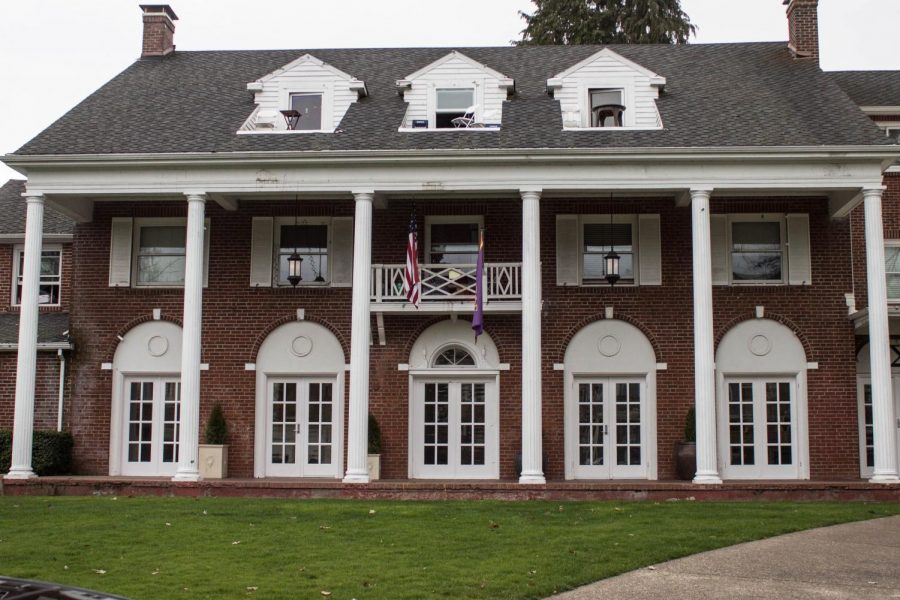Center for Fraternity and Sorority Life works to create positive living environments
February 26, 2018
Different from on-campus living or in an apartment, the Center for Fraternity and Sorority Life offers the opportunity for students to live in a housed chapter for a fresh experience.
Oregon State University boasts a large fraternity and sorority community that includes five separate councils. Two of these councils, the Interfraternity Council and the Panhellenic Council, include housed chapters wherein students can choose to live if they are a member of that respected organization, according to Leslie Schacht Drey, director for the Center for Fraternity and Sorority Life.
“Living in the chapter house of a fraternity or sorority is an experience that is truly a once-in-a-lifetime opportunity that you can generally only get as a college student,” Schacht Drey said via email. “The fraternal, or cooperative, component of living in a housed fraternity/sorority contributes to a sense of group ownership of the experience – all residents contribute in some way to the overall living environment through shared responsibilities for day-to-day management and upkeep.”
The chapters that do have a house within the CFSL community are all located off-campus and are privately owned and operated, according to Schacht Drey. The undergraduate chapter, student organization, lease the house from their national organization. The chapter may also lease from a local house corporation, which is a group of alumni that operate the facility. To live within a specific house, an individual generally needs to be a part of the organization and have access to the amenities. Being exclusive to members of the chapter, the idea of brotherhood or sisterhood is a core component to the live-in experience, Schacht Drey added.
Housed fraternities and sororities include a live-in house director, who is often referred to as the “house mom” or “house dad.” This position is filled by a non-undergraduate student who serves in a maternal or paternal role for those living in the house, according to Schacht Drey. Duties done by this individual include day-to-day maintenance of the house and helping to create expectations for residents to follow while interacting with one another.
“The chapter house will often serve as a home away from home for students who are members of housed fraternities/sororities. Even members who don’t live in the structure will consider it a place where they belong and can feel a great deal of pride in the appearance of the home,” Schacht Drey said via email.
According to the IFC President Kyle Daniel, chapters will often use their houses for business meetings, studying and social events related to philanthropies, on top of being places of residence.
“Fraternity housing is unique in that it helps individuals bond together with the brothers of their fraternity,” Daniel said over email. “It is like living on a residence hall floor with all of your best friends. In my experience with fraternity housing, I found it amazing that there is always another brother in the house willing to hang out and spend time with you at any given moment. It is a place where lots of work gets done, but also provides lots of entertainment on a daily basis.”
As each fraternity and sorority is privately owned and operated, they have the autonomy to create their own live-in requirements and expectations of its members. In general, many students will move into a house during their second year of membership and live there one to two years, according to Schacht Drey. This can vary, as some chapters are participants in the Affiliated Housing Program that allows first-year students, who are members of the specific chapter, to gain an exemption from the live-on campus requirement.
The Affiliated Housing Program allows qualifying organizations to request inclusion as an approved facility for students subject to the OSU First Year Experience Live-on Requirement, according to the AHP webpage. The program offers first year students at OSU a safe, healthy and educationally beneficial housing option that runs consistent to the experience of on campus residents.
“Many fraternities have live-in requirements for their members. If someone is interested in joining a housed fraternity at OSU they should be aware of their policies regarding live-in requirements,” Daniel said over email. “Some chapters may mandate that all members are required to live in the house for at least a year, maybe more. This is highly variable from chapter to chapter, so it is important to know the live-in requirements upon joining a chapter.”
Perks that come with housing include options for cheaper amenities for those who live in the community as opposed to other living situations, according to Daniel.
“Fraternity housing is often cheaper than many equivalent places of residence like residence halls or off-campus housing,” Daniel said via email. “Fraternity houses come with a variety of amenities. Many of them have a chef that cooks meals for the members. Many houses offer a place to wash/dry clothes, a private study room, a common area with games like foosball or billiards.”
McKenna Moore, Panhellenic president, said that chapter housing offers a strong sense of community beyond the material advantages of the living space.
“I think that some benefits of living in a house are the sense of brotherhood/sisterhood and community,” Moore said in an email. “I also think that it provides a potentially more cost-efficient living opportunity for some people. Additionally, I think that people decide to live in a house because they get a very special fraternity/sorority experience.”
OSU currently recognizes 30 housed fraternities and sororities; 19 fraternities and 11 sororities, according to Schacht Drey. The number of individuals living in a house varies with the year, but generally, 1,300 to 1,500 OSU students will choose fraternity and sorority living. Each chapter sets its own live-in capacity, which can go from 20 residents to 80 depending on the size of the facility.
For further information on housing within fraternity and sorority life or general info, go to the CFSL webpage to learn more.











































































































